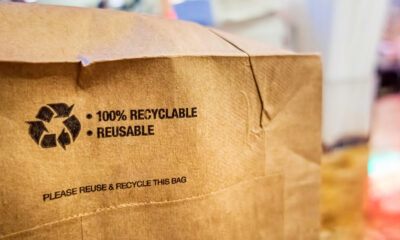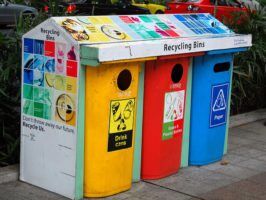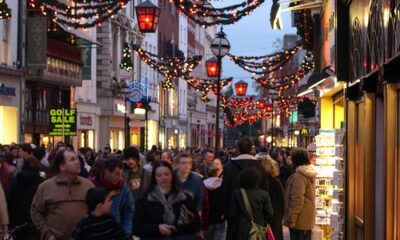Environment
Retail is going green
A report looking at how sustainable the retail sector is says that much work has been done by shops to reduce their waste, energy and water usage as they recognise these changes make business sense as well as impressing customers. Charlotte Reid has more.
The British Retail Consortium (BRC) has released a report detailing how environmentally friendly retailers really are.
 A report looking at how sustainable the retail sector is says that much work has been done by shops to reduce their waste, energy and water usage as they recognise these changes make business sense as well as impressing customers. Charlotte Reid has more.
A report looking at how sustainable the retail sector is says that much work has been done by shops to reduce their waste, energy and water usage as they recognise these changes make business sense as well as impressing customers. Charlotte Reid has more.
The British Retail Consortium (BRC) has released a report detailing how environmentally friendly retailers really are.
The report, called A better Retailing Climate: Towards Sustainable Retail, reveals that there has been a reduction in the amount of waste sent to landfill as well as a reduction in delivery emissions. Aims to cut energy related emissions from buildings and to reduce emissions from refrigeration are currently on target.
A number of shops saw praise for their work. Sainsbury’s were applauded for taking on 20 ambitious challenges to improve sustainability. These challenges varied from reducing the amount of packaging they use to doubling the amount of British food available in stores.
Waitrose was commended for its biomass-powered stores. In fact all major supermarkets were praised for their involvement in the Love Food, Hate Waste campaign.
Research has shown that while shoppers are wasting less food they are still throwing away 10% of their weekly shop. To help counteract this retailers and brands have spent £10m on helping their customers to reduce their waste by improving packaging to ensure that food is stored correctly and handing out recipes for leftovers as well.
The BRC’s head of environment, Bob Gordon, said, “Despite current economic difficulties, retailers are continuing to work with their suppliers to meet tougher sustainability goals”.
He added, “This BRC assessment shows that the UK has the most progressive retail sector in the world and crucially that work with consumers and environmental groups is driving standards up. Some previous targets have been met ahead of schedule but investment continues, protecting consumers’ wallets and the planet”.
Customers have shown that when shopping they do take into consideration the environment. Figures from The Co-operative’s annual consumerism report show that the sale of ethical goods was worth £46.8bn last year.
Our in-depth report into ethical shopping illustrated that customers believe that supermarkets have the most influence when it comes to changing shopping habits.
The BRC report says that more can still be done for the sake of the environment. In an independent assessment of the report, Forum for the Future said that “there is no room for complacency, as some of the targets are not that stretching”.
Some of the recommendations to continue improvements in retail include “supporting their customers to be sustainable” and to start thinking about and experimenting with “alternative, sustainable business models”. The report points to the rapid increase in online shopping to show how quickly business can change.
It is also important that “retailers must continue to deliver customer priorities on price, quality and service first, while developing increasingly sustainable products and services” warns the report.
Show supermarkets that environmental behaviour is a necessity by shopping at places that already recognise how important it is to be sustainable. Blue and Green Tomorrow recommends the Ethical Superstore.


 Environment12 months ago
Environment12 months agoAre Polymer Banknotes: an Eco-Friendly Trend or a Groundswell?

 Features11 months ago
Features11 months agoEco-Friendly Cryptocurrencies: Sustainable Investment Choices

 Features12 months ago
Features12 months agoEco-Friendly Crypto Traders Must Find the Right Exchange

 Energy11 months ago
Energy11 months agoThe Growing Role of Solar Panels in Ireland’s Energy Future





























